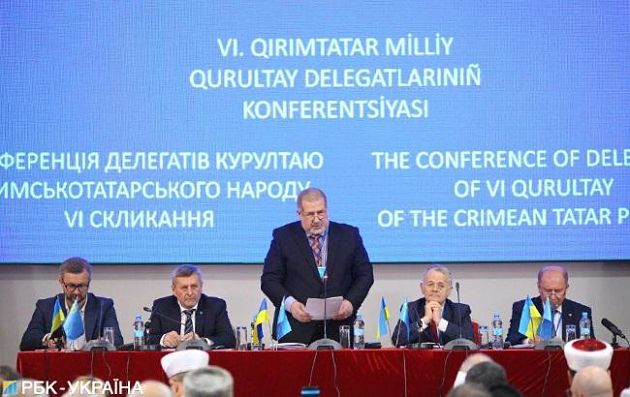Recently, the Crimean Tatars held two parallel national congresses-one in Kiev, organized by the Mejlis of the Crimean Tatar People, and the other in Simferopol, organized by the Spiritual Administration of Muslims of Crimea (DUMC). This parallelism and the decisions made at both events effectively solidified the division of the Crimean Tatar community into two main factions since 2014 – those who collaborate with the Kremlin and are grouped around the DUMC, and the pro-Ukrainian national resistance represented by the Mejlis.
The former in Crimea decided to confiscate the property of the Mejlis, while the latter called on Crimean Tatars to stop attending mosques controlled by the DUMC and to stop praying with their imams. Ilmi Umerov, the deputy chairman of the Mejlis and a former political prisoner, explained the latter decision as follows: “Unfortunately, the current composition of the Crimean Muftiate, headed by a pro-Kremlin mufti, is fully controlled by the Russian authorities in Crimea. The Mufti and his entire structure are considered a collaborationist structure. We consider them traitors.
Aider Rustemov, the Mufti of the Crimean Tatar immigrants who heads the Spiritual Administration of Muslims of the Autonomous Republic of Crimea, echoed his sentiments, stating that the so-called Muslim clergy of Crimea is completely bought and controlled by the FSB. In such a “competition,” both structures are forced to fight for the hearts and minds of the Crimean Tatars.
The leaders of the Mejlis called on their supporters on the peninsula to intensify their effective underground activities and choose appropriate methods of cooperation with their compatriots. “Over the years, we got used to meeting openly and discussing current problems. We could come to the ATR television channel and address tens of thousands of fellow citizens. Today the reality is different. Perhaps not everyone has realized that there are times when we need to return to traditional methods of disseminating information: taking a bicycle or a car and going from house to house to talk to people,” said Mejlis member Nariman Dzhelal.
Delegates from the pro-Kremlin Kurultai voted to intensify the return of compatriots left in Central Asia as a result of the Stalinist deportations and to release members of banned Islamic organizations from prison if they publicly renounce them. It remains to be seen, however, what legal and factual effect such decisions will have on the Russian authorities, who alone are in a position to decide on such matters.
Against the backdrop of these “wishes,” the Mejlis is demonstrating its ability to actively influence the current Ukrainian government. For example, Ukrainian President Petro Poroshenko sent a letter to the delegates of the Kurultai in Kiev, informing them of the progress in amending the country’s constitution regarding the status of the Autonomous Republic of Crimea as an autonomy of the Crimean Tatar people within Ukraine. He also expressed the solidarity of the Ukrainian state and society with the Crimean Tatars, against whom the Kremlin is effectively pursuing a policy of ethnocide. “I know that the occupiers are deliberately creating a situation where being a Crimean Tatar in today’s realities of the peninsula is already essentially a criminal offense. And having any connection with the representative bodies of the Crimean Tatar people, even more so. After years of exile, after returning to the homeland, your people were able to revive the functioning of their representative organizations, and now the aggressor is trying to “suppress” the national institutions and deprive you of what the Crimean Tatar people acquired at a dear price. But I don’t think that Russia has yet realized the futility of its actions. There is no doubt that the Crimean Tatar people, along with the Ukrainian people, enjoy the support of the international community,” Poroshenko said in his letter.
However, it should be noted that not everyone in Ukraine supports the idea of granting national-territorial autonomy to the Crimean Tatars. Therefore, in the context of competition between pro-Russian and pro-Ukrainian Crimean Tatar projects, the acceptance or rejection of such amendments will be indicative. The current Russian authorities cultivate the idea of a “Russian Crimea,” even using the name “Taurida” to detatarize the peninsula on a symbolic level. However, in addition to the stick, they are also ready to offer “carrots” (mostly of a material nature) to those Crimean Tatars who are willing to compromise. On the other hand, Ukraine does not have the ability to offer “carrots” to the Crimean Tatars who fell under Russian rule. Instead, it can offer them something more meaningful – the status of a people who are the owners of this land, recognized as their national territory. But if this is ultimately not done, the ephemeral Ukrainian offer, which essentially promises to remove the “stick” against the backdrop of even a small Russian “carrot,” is unlikely to be an incentive for the remaining Crimean Tatars to tie their future to the state of Ukraine.
The second aspect that pro-Ukrainian Crimean Tatars should pay attention to is their own Islamic identity. Yes, the call for Crimean Muslim Tatars to boycott the institutions of the collarb…

